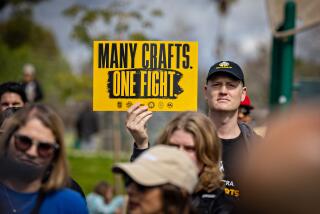As Hollywood reopens, COVID-19 liability waivers abound. What are they and should you sign?
- Share via
As many production companies attempt to resume filming, many are asking crews to give up the right to make any claims against them if they get sick with COVID-19.
Such liability waivers are being widely used despite many of Hollywood’s entertainment unions cautioning members not to sign them before first getting advice.
To sign or not to sign is a quandary facing thousands of entertainment industry workers who are eager to go back to work after a months-long shutdown.
Some crews have been spooked by the use of such waivers, a reminder of the risks that they are taking going back to work on crowded, busy sets.
“We don’t want any of our members waiving any of their rights, period,” said Steve Dayan, secretary-treasurer of prominent Teamsters Local 399, which represents casting directors, location managers and drivers. “The onus remains on the employer. It’s the employer’s responsibility to make sure they maintain a safe set.”
John Nolan, an assistant director who died last week after a battle with COVID-19, worked on a commercial shoot in Texas.
So what are these waivers and how did they emerge?
The pandemic forced productions nationwide and internationally to shut down as governments imposed stay-at-home orders. Since June, California has allowed filming to restart as long as sets follow stringent guidelines around sanitation and testing. Many productions may be having to make do without insurance for losses linked to the coronavirus.
So like many other businesses and hospitals, productions increasingly require their crew to fill out healthcare questionnaires, sometimes on a daily basis.
While union officials want to ensure these don’t lead to any breaches of privacy of crews’ medical conditions, generally they want their members to comply with these surveys to keep sets safe.
However, from these initial quizzes, producers started to make a broader push for actors and technicians to waive their rights should they get sick.
“Enterprising people, lawyers, maybe others thought, ‘Oh, well, if they’re already filling out this form, why don’t we have them sign something that basically in some form tries to limit the liability of the employer for potential risk?,’” said Duncan Crabtree-Ireland, SAG-AFTRA’s chief operating officer and general counsel, who is leading the union’s safety and reopening initiative. “We started very rapidly seeing this language appearing often on the same page with these health questionnaires.”
A liability waiver in these cases would be an agreement to release the other party from any claims relating to sickness or injury due to the coronavirus.
They don’t necessarily appear as another big contract but can simply be a paragraph in a hiring agreement, according to attorneys.
Similar such clauses to protect productions have been attempted in other parts of the industry.
In unscripted TV, for example, some producers included provisions in crew releases that would allow them to sue crew members for millions of dollars if they leaked who won a reality competition, said attorney Ivy Kagan Bierman, a partner at Loeb & Loeb. But the International Alliance of Theatrical Stage Employees pushed back and many producers stopped including such waivers in their crew releases, she said.
However, now these waivers are being widely used to manage risks linked to COVID-19.
“They are still prevalent,” said Kagan Bierman. Many clients of her firm have reached out about having them drafted, she said. She doesn’t recommend they ask crews to waive claims linked to gross negligence, willful misconduct and workers’ compensation because it is unlikely such waivers are enforceable. However, Kagan Bierman believes that more narrowly defined waivers could be enforceable.
Why are producers demanding them?
Producers face new costs and real risks associated with the pandemic. Shoots are taking longer and they risk thousands of dollars in losses if production is shut down. They also need to employ more people to enforce safety rules and sanitize sets. In the face of this, and the lack of insurance available to cover losses due to COVID-19, many companies are using these waivers to help mitigate their risks, attorneys said.
“It’s tough on the employer,” said Los Angeles-based entertainment attorney Jody Simon at law firm Fox Rothschild, who has been advising independent productions issuing such waivers. “You can go through all the protocols and, you know, the employer’s really not being negligent if the employee gets sick.”
Simon said many of his clients are including assumption of risk and releases in employment agreements for crews. Such agreements would give the employer some protection from any claims if the worker gets sick.
“If I have a production going forward, I would put that in a crew deal memo,” he said. “But an employer can’t make an employee release a workers’ compensation claim.”
Although stars are more likely to want to negotiate such clauses out, such releases are common in unscripted shows. Simon said he is employing them in deals for home renovation shows for channels such as HGTV, where crews will typically sign away “pretty substantial rights,” Simon said.
So what’s the problem?
Entertainment unions have urged their members not to sign COVID-19 liability waivers. One concern is to protect the privacy of their members, should they get sick or have a preexisting condition. Union leaders also want to make employers accountable for maintaining safe workplaces.
“The idea is to make the employee think that they are responsible for their own treatment and to think that they aren’t entitled to take advantage of paid sick leave,” said Crabtree-Ireland. “And maybe to try to discourage people from filing workers’ comp claims.”
In May, Gov. Gavin Newsom signed an executive order for essential workers who contract COVID-19 to obtain workers’ compensation benefits in a win for labor unions that called for the change. Companies will now have to prove the workers didn’t get sick at work.
Under federal law and the law of some states like California, Crabtree-Ireland said it is unlawful for an employer to try to get an employee to waive workplace safety because it is the employer’s responsibility legally to provide a safe workplace, he said.
So what if you have to sign a waiver to get the job?
Crabtree-Ireland recommends guild members sign the document and then report it to their union, rather than risk losing the job. Under federal labor laws, employers have to negotiate such waivers with unions, he said.
For nonunionized workers, the situation is more complicated.
“If you’re a nonunion employee, then the question of the validity of the waivers is going to depend on whether they’re written in such a way that they violate applicable state law or federal law,” Crabtree-Ireland said.
More to Read
Inside the business of entertainment
The Wide Shot brings you news, analysis and insights on everything from streaming wars to production — and what it all means for the future.
You may occasionally receive promotional content from the Los Angeles Times.











